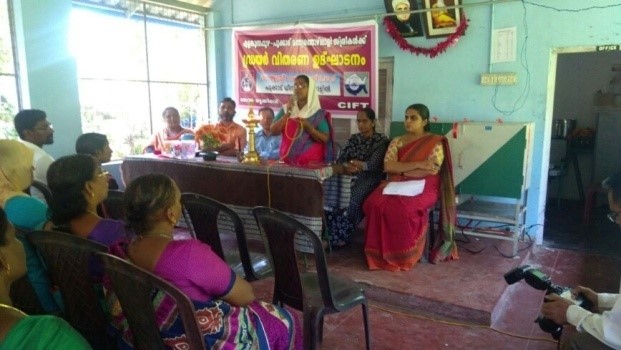Kerala, India – Women in the Fishery Sector are afflicted by many challenges like unhygienic market conditions, apathy towards the sector in general and women in particular, cut-throat competition, and inability to keep their produce dry and fresh, etc. SEWA-Kerala has been lobbying on their behalf with government authorities and thanks to their relentless efforts, two initiatives have been introduced.
A group of 10 fisherwomen of Pookkad Village-Ernakulum District has been gifted a fish drier by the Central Institute of Fisheries Technology (CIFT). This machine is ideal for drying fish, fruits, vegetables, spices, and agro-products. Some of the benefits which the fish drier will serve are: hygienic drying without changing the colour and flavour of the product, reduction in drying time with improved product quality, improved shelf life and value addition of the product which will, in turn, fetch higher income for the
fisherfolk, cutback in labour requirement, and elimination of re-handling processes like spreading, sorting and storing. The best part is that in the pipeline are two more fish driers from CIFT.
Yet another piece of good news for the fishery sector in Kerala is the inclusion of Fish Processing Units by the District Panchayat which will make them eligible for receipt of iceboxes and fish driers. #
About MTCP2
The Medium-Term Cooperation Program Phase 2 (MTCP2), a five-year capacity building program supported by the International Fund for Agricultural Development (IFAD), the Swiss Agency for Development and Cooperation (SDC), and the European Union (EU) , has been implemented in 22 countries across three sub-regions—Southeast Asia (through the ASEAN Farmer Organization Support Program-AFOSP-MTCP2), South Asia, and the Pacific—engaging 86 national federations of farmers organizations with 1,628 sub-national farmers organizations (FOs) with a total membership of around 43.5 million small-scale women, men and young farmers. The funding support (12 million USD) served as a catalytic fund that allowed FOs to enhance their capacity to engage in policy dialogues and to be effective channels of economic services to farmers. The program has contributed to the formation of strong national platform of FOs with improved capacity to engage in constructive policy processes and mobilize resources from mainstream agricultural development programs like extension services, credit, and pre and post-harvest facilities. The program also helped in re-structuring farmers’ associations into community-based social enterprises or as commodity-based cooperatives as well as consolidating FOs into agricultural cooperative federations/union to strengthen the role of small-scale farmers within an inclusive and sustainable value-chain. The program is being implemented by the consortium Asian Farmers’ Association for Sustainable Rural Development (AFA) and La Via Campesina (LVC).




Comments are closed